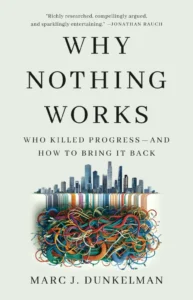
A new book joins a chorus of recent analysis that blames too much bureaucracy in how everything from houses to power lines are approved for why America can’t seem to build vital things anymore. iStock illustration
From the Revolution on down to the heady days of the postwar boom, Americans were known for their rough-and-ready, frontier optimism.
It was a can-do spirit that took us to the Moon, defeated the Nazis,and eventually consigned communism to the dustbin of history. In the decades after World War II, it helped us build the most dynamic and prosperous society the world had ever seen.
So how did we become a nation of NIMBY cranks, nitpickers and chronic negativity, where success is measured not by what you can build, but what you can stop or tear down?
And if we’re NIMBY Nation, then Massachusetts, where even plans for a two-bit apartment building will draw naysayers warning of environmental doom, has got to be its spiritual heartland.
In “Why Nothing Works: Who Killed Progress – and How to Bring It Back,” Marc Dunkelman, a fellow at Brown University’s Watson School for International and Public Affairs, takes aim at that question.
And Dunkelman, a former congressional staffer and self-described Progressive, bravely offers up an answer that places a significant part of the blame on decades of dysfunction within his own political tribe.
Roots in a Radical Time
The late 1960s saw a rebellion against all levels of authority in American society, referred to by the hip and radical as “the establishment” or “the system” or just simply as “the man.”
The Vietnam War, rampant pollution and the bulldozing of urban neighborhoods to make way for new highways inspired growing suspicion on the left of the government and its motives, Dunkelman writes.
Progressives had once championed a muscular government in the mold of President Franklin Delano Roosevelt’s New Deal and President Lyndon Johnson’s Great Society.
But in the late ’60s and ’70s, the New Left campaigned for, and won, a host of new laws and regulations that dramatically reined in centralized power, both public and private, he notes.
“Speaking truth to power – that was not a thing in the Kennedy administration,” Dunkelman told me in a recent interview. “By the time you get to the Nixon administration, everyone wants to do that.”
Yet in the decades to come, the pendulum swung so far in the opposite direction that it choked off housing production and killed plans for desperately needed infrastructure work, from transmission lines and nuclear plants to new tunnels, bridges and railways.
Dysfunction Everywhere
The reforms had decentralized decision-making over big projects while creating reams upon reams of new environmental and other regulations, making it far harder – and much more expensive – to build anything.
And the resulting dysfunction helped sour the public on government as a whole, reinforcing conservative critiques, such as Ronald Reagan’s famous quip: “The nine most terrifying words in the English language are ‘I’m from the government and I’m here to help.’”
As an example, Dunkelman points to the years of delays and rising costs of plans to build a 145-mile transmission line through the Maine woods to funnel hydropower from Quebec to Massachusetts as part of the state’s efforts to decarbonize its electric grid.
An odd-couple alliance of environmentalists and fossil fuel interests was able to tie up the project for nearly a decade with regulatory and legal challenges and a statewide referendum.
The cost has doubled to $1.5 billion, while construction of the long-delayed transmission line has missed yet another deadline and now won’t be completed until 2026, further delaying the kinds of green electricity Progressives in Massachusetts want homeowners and office towers to buy for their new heat pumps.
“That story is just a labyrinth of craziness – towns along the [transmission line] corridor signing off [on the project] and then pulling out,” Dunkelman said. “It is absolutely mindboggling the degree to which the whole thing is just bananas.”
The Big Winners? Trump & Co.
With an anecdote from 1980s New York City, Dunkelman also makes clear in “Why Nothing Works” who he believes has been a major political beneficiary of all this government-induced paralysis.
Then-Mayor Ed Koch was stuck with a mess on his hands, with the city having spent millions of dollars to build a new ice rink. The was only one small problem: no ice, thanks to an issue with how the refrigeration system was installed.
A developer came forward and offered to rescue the project and did just that, bringing it in on time and more than $700,000 under budget, winning accolades from the public and in the press.
Dunkelman purposely holds back the developer’s identity until the end of the anecdote, who, if you haven’t guessed by now, was Donald Trump.
For voters frustrated over decades of gridlock, from Washington, D.C., down to local towns and city halls, it’s not hard to see the attraction of Trump’s throw-out-the-rulebook approach in his relentless pursuit of various goals, his impatience with bureaucratic process, and his emphasis on action.
Trump is responding to a public disgust with the institutions of government, Dunkelman believes. And he warns that voters will keep turning to people like Trump and his successors if nothing changes.
Dunkelman’s Solutions
So what’s the solution?
Dunkelman isn’t arguing that we should go back to the 1950s, when a powerful urban planner in a major city could declare a neighborhood a slum and have it bulldozed for redevelopment.

Scott Van Voorhis
But he contends that some governmental body or official, at the end of the day, needs to be entrusted with the power to make hard decisions, which, by their very definition, aren’t going to be universally pleasing or popular.
Dunkelman noted there are also proposals to put “shot clocks” on reviews of projects, ensuring they don’t drag on for years, to limit judicial review of projects to a few months, and to streamline and limit the extent of environmental reviews.
Meanwhile, Dunkelman has been going on podcasts, talking with reporters, and meeting with real estate executives and other groups, both in Boston and in other cities.
“Why Nothing Works,” which came out earlier this year, has been compared to Ezra Klein and Derek Thompon’s blockbuster, “Abundance.”
But Dunkelman is also clearly delivering a much-needed message as well.
“America is today the victim of a ‘veto-cracy’ that allows nearly anyone to stifle progress,” Dunkelman writes. “While conservatives deserve some blame, progressives have overlooked an unlikely culprit: their own fears of ‘The Establishment.’”
Scott Van Voorhis is Banker & Tradesman’s columnist and publisher of the Contrarian Boston newsletter; opinions expressed are his own. He may be reached at sbvanvoorhis@hotmail.com.






